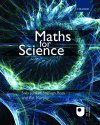Textbook
Out of Print
By: Sally Jordan(Author), Shelagh Ross(Author), Pat Murphy(Author)
400 pages, 150 colour illustrations
![Maths for Science Maths for Science]()
Click to have a closer look
About this book
Contents
Biography
Related titles
About this book
Maths is a tool for representing and investigating the nature of the real world: it can simplify the huge complexity of natural processes, enabling us to make predictions and test assumptions. Without maths, the process of scientific enquiry would quickly stall. Yet, for many, maths is seen as a daunting, theory-filled subject, with little relevance to the real world. Maths for Science overturns these misconceptions by providing a confidence-boosting overview of essential mathematical skills and techniques.
With examples and practice problems throughout, it shows in a clear, unintimidating style why maths is so important to the study of science, and encourages you to develop the essential skills for yourself. Building from the foundations of maths – numbers, fractions, and units and scales of measurement – the book leads you through a range of widely-used skills and concepts, including the handling of equations, logarithms, and the essentials of differentiation, probability and statistics, to provide a complete course of essential maths for science.
Contents
1. Starting points;
2. Measurement in science
3. Calculating in science
4. Unit conversions
5. Algebra
6. Putting algebra to work
7. Graphs and gradient
8. Rate of change and differentiation
9. Angles and trigonometry
10. Logarithms
11. Probability and descriptive statistics
12. Statistical hypothesis testing
Customer Reviews
Biography
Sally Jordan is a senior lecturer in The Open University's Department of Physical Sciences and is a science staff tutor at The Open University in the East of England, responsible for the delivery of OU science modules throughout East Anglia. She has written teaching materials to develop mathematical skills across a range of Open University science modules, and is chair of the OU's introductory science module, Science Starts Here.
Shelagh Ross and Pat Murphy each have more than 30 years' experience of Open University teaching in physics, biology and interdisciplinary science across a range of levels.
Textbook
Out of Print
By: Sally Jordan(Author), Shelagh Ross(Author), Pat Murphy(Author)
400 pages, 150 colour illustrations


































